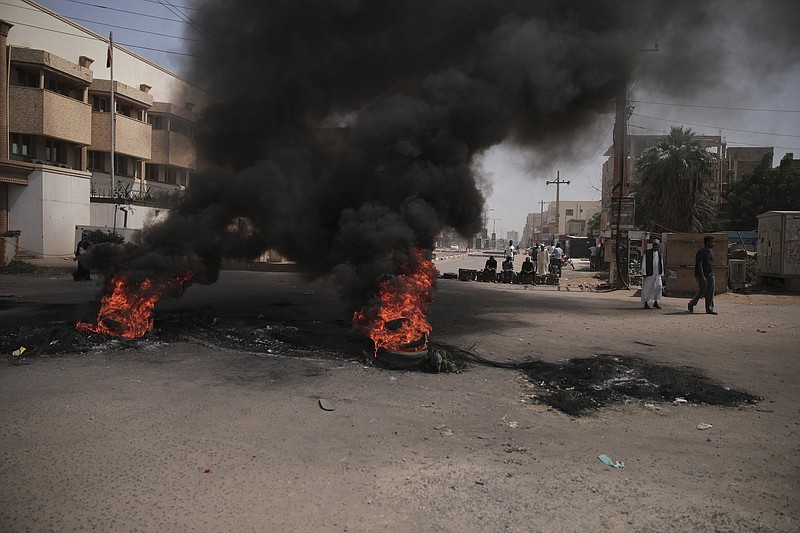CAIRO -- Sudan's deposed prime minister and his wife were allowed to return home Tuesday after being detained when the military seized power in a coup, officials said.
The release of Prime Minister Abdallah Hamdok and his wife followed international condemnation of the coup and calls for the military to release all of the government officials who were detained when Gen. Abdel-Fattah Burhan seized power Monday.
Burhan had said earlier Tuesday that Hamdok had been held for his own safety and would be released. But he warned that other members of the dissolved government could face trial as protests against the putsch continued in the streets.
[Video not showing up above? Click here to watch » https://www.youtube.com/watch?v=Rjt0jC-dbHY]
Hamdok and his wife were returned to their home in Khartoum's upscale Kafouri neighborhood, and the house was under "heavy security," said a military official, speaking on condition of anonymity because he was not authorized to brief the media. The official did not say whether they were free to leave or make phone calls. An official at Hamdok's office and pro-democracy activist Nazim Siraj confirmed his return home.
The military seized power Monday in a move that was widely denounced abroad. On Tuesday, pro-democracy demonstrators blocked roads in the capital of Khartoum with makeshift barricades and burning tires. Troops fired on crowds a day earlier, killing four protesters, according to doctors.
In his second public appearance since seizing power, Burhan said Tuesday that the military was forced to step in to resolve a growing political crisis.
"There were people who were talking about discriminating against others, and that was driving this country to reach a civil war that would lead to the fragmentation of this country, tearing apart its unity, its fabric and society. These dangers were in front of us," Burhan said in a televised news conference.
But the coup came less than a month before Burhan was supposed to hand the leadership of the Sovereign Council that runs the country to a civilian -- a step that would have decreased the military's hold on power.
"The whole country was deadlocked due to political rivalries," Burhan said. "The experience during the past two years has proven that the participation of political forces in the transitional period is flawed and stirs up strife."
Hamdok had been held at Burhan's home, the general said, and was in good health. But of the many other senior government officials detained Monday, Burhan alleged that some had tried to incite a rebellion in the armed forces, saying they would face trial. Others who are found innocent would be freed, he added.
The takeover came after weeks of mounting tensions between military and civilian leaders over the course and the pace of Sudan's transition to democracy. It threatened to derail that process, which has progressed in fits and starts since the overthrow of longtime autocrat Omar al-Bashir in a popular uprising two years ago.
The U.N. Security Council was to discuss the situation in Sudan, a nation in Africa linked by language and culture to the Arab world, at a closed-door meeting later Tuesday. U.N. Secretary-General Antonio Guterres urged world powers to come together to act decisively, saying unity was needed to confront an "epidemic of coups d'etat" recently.
Hamdok's office had voiced concern for his safety and for the other detained officials. In a statement, it accused the military leaders of acting in concert with Islamists, who have argued for a military government, and other politicians linked to the now-dissolved National Congress Party, which dominated Sudan during al-Bashir's Islamist-backed rule.
President Joe Biden's administration announced the halt of $700 million in emergency assistance to Sudan and said Tuesday it was looking at sending stronger signals to the generals.
"They should first and foremost cease any violence against innocent civilians, and ... they should release those who have been detained and they should get back on a democratic path," said National Security Advisor Jake Sullivan, adding that the U.S. is working with countries where the generals have allies.
Mariam al-Mahdi, the foreign minister in the dissolved government, declared Tuesday that she and other members of Hamdok's administration remained the legitimate authority in Sudan.
"We are still in our positions. We reject such coup and such unconstitutional measures," she told The Associated Press by phone from her home in Khartoum. "We will continue our peaceful disobedience and resistance."
The Ministry of Culture and Information, still loyal to the deposed government, said in a Facebook post that Sudanese ambassadors in Belgium, Switzerland and France have defected.
Nureldin Satti, the Sudanese envoy to the U.S., said he was working with those diplomats to "resist the military coup in support of the heroic struggle of the Sudanese people" to achieve the aims of the uprising against al-Bashir. But he did not say whether he had defected.
